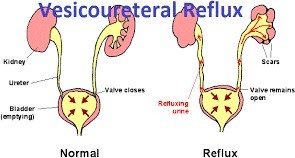A child with a new diagnosis of Vesico-Uretal-Reflux VUR) is being discharged with a long term prescription for antibiotics. The parents ask why their child will be taking antibiotics for a long time. The nurse's best response is ...
Antibiotics will help your child urinate more easily
"Antibiotics will control the autoimmune process your child is experiencing
The antibiotics will decrease the risk for urinary tract infections.
The antibiotics will cure the VUR if taking long term
The Correct Answer is C
Vesico-Ureteral Reflux (VUR) is a condition where urine flows backward from the bladder into the ureters and potentially up to the kidneys. This can increase the risk of urinary tract infections (UTIs) and potential kidney damage. By taking antibiotics for a longer duration, the aim is to prevent or reduce the occurrence of UTIs. Antibiotics help to eliminate or control bacterial growth in the urinary tract, reducing the risk of infection and associated complications. It is important to clarify that long-term antibiotic use does not cure VUR but rather helps manage the risk of UTIs.

Nursing Test Bank
Naxlex Comprehensive Predictor Exams
Related Questions
Correct Answer is A
Explanation
Anaphylaxis is a severe and potentially life-threatening allergic reaction that can lead to a rapid drop in blood pressure, known as hypotension. This drop in blood pressure is a critical indicator of the severity of the reaction and the effectiveness of the treatment provided. The nurse needs to monitor the patient's blood pressure closely to ensure it stabilizes and returns to a safe range.
While oxygen saturation, heart rate, and orientation are also important parameters to assess, they are secondary to blood pressure in evaluating the effectiveness of treatment for anaphylaxis. Oxygen saturation can help determine the adequacy of oxygenation, heart rate can indicate the presence of tachycardia (which may be a sign of an ongoing reaction or hypoperfusion), and orientation can provide information about the patient's mental status and potential complications.
Correct Answer is A
Explanation
Glipizide is an oral antidiabetic medication commonly prescribed to manage type 2 diabetes. It works by stimulating the release of insulin from the pancreas, which helps lower blood glucose levels. However, there is a risk of hypoglycemia (low blood sugar) with the use of Glipizide.
It is crucial for the client to be aware of the signs and symptoms of hypoglycemia so that they can take appropriate action if their blood sugar drops too low. These symptoms may include sweating, trembling, dizziness, confusion, weakness, and hunger. By recognizing these signs, the client can promptly address hypoglycemia by consuming a source of fast-acting glucose, such as fruit juice or glucose tablets, as instructed by their healthcare provider.
Whether you are a student looking to ace your exams or a practicing nurse seeking to enhance your expertise , our nursing education contents will empower you with the confidence and competence to make a difference in the lives of patients and become a respected leader in the healthcare field.
Visit Naxlex, invest in your future and unlock endless possibilities with our unparalleled nursing education contents today
Report Wrong Answer on the Current Question
Do you disagree with the answer? If yes, what is your expected answer? Explain.
Kindly be descriptive with the issue you are facing.
